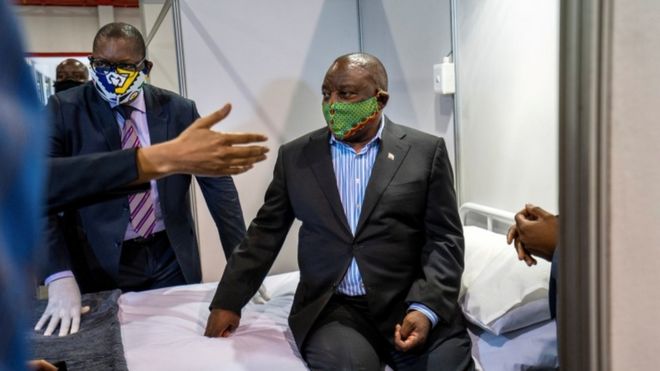South Africa's president has said coronavirus infections appear to have peaked in the country, as he announced a sweeping relaxation of lockdown measures.
President Cyril Ramaphosa said nearly all restrictions on the country's economy will be eased from Monday.
A controversial ban on the sale of alcohol and tobacco will be lifted.
Domestic travel, small family gatherings and the reopening of businesses will all be allowed.
In a TV address on Saturday, Mr Ramaphosa said the easing of restrictions will help to revive the country's flagging economy after a period of great hardship for the country.
However, he called on South Africans not to let their guard down against Covid-19 despite "signs of hope", warning of difficult times ahead.
The country has recorded more than half of Africa's coronavirus infections, with more than 570,000 cases and 11,500 deaths to date.
How fast is coronavirus spreading in Africa?
South Africa also has the fifth-highest number of cases in the world after the US, Brazil, Russia and India, but infections have started to dip in recent days.
Mr Ramaphosa said the number of new daily confirmed cases had dropped from a peak of more than 12,000 to an average of 5,000 over the past week.
The number of active cases has declined to about 105,000 and the recovery rate risen to 80%, the president said.
"As we look back at the past five months, all indications are the South Africa has reached the peak and moved beyond the inflection point of the curve," Mr Ramaphosa said.
How has South Africa handled its coronavirus outbreak?
In March, the South African government introduced some of the toughest lockdown restrictions in the world. Borders were shut to international travellers, schools were closed, alcohol was banned and people were told to stay at home.
Those measures were credited with slowing the initial spread of Covid-19, giving the health sector valuable time to prepare for more patients.
Meanwhile, the economy faltered as businesses struggled to stay afloat during lockdown.
To ease the economic pain, the government began a gradual reopening in June, but restrictions were reintroduced last month as infection rates began to rise again. A state of emergency was declared effective until 15 August.
A large proportion of South Africa's coronavirus infections have been reported in Gauteng, the country's financial hub.
The influx of patients has put an incredible strain on South Africa's hospitals. A BBC investigation found an array of systematic failures that had exhausted healthcare professionals and brought the health service in some areas near to collapse.

